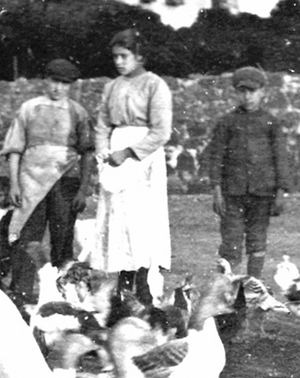There are those who take Christ’s commandment “thou shalt not judge” (Mt 7:1-6) as a philosophical sentence that aims at suspending all judgment, at all times and in all places. It would be necessary, therefore, to give in to a kind of suspension, of restraint marked by relativism; everything would have to be without a scale of values or appreciation. To give one’s opinion would be seen as an overstatement, the worst of vanities—the horror—almost nihilism. We would have to think of a life without truth that would lead us to a dead end. We thus read Christ as we read Sextus Empiricus, who urges us, in the face of the complexity of the things of life, to practice epoché, the virtue of the suspension of judgment, as a purgation against blabber, an extinction of bad, diffuse and confused thoughts, golden silence in the face of bronze logorrhea and endless palaver in search of the truth. You will not judge because my life is my life, your life is yours; we do what we want; you do your job and I’ll do mine. In essence, the provisional morality of the moderns is always in this direction.
It is because Jesus Christ died and rose again that His words have a scope that goes beyond the practical remarks of a Stoic philosopher. What Tertullian found absurd while giving him faith, credo quia absurdum; what is a folly born of the cross; what is a grandiose struggle against death, life—ends in eternal glory and gives Jesus’ words a strength that connects us to heaven. None of the great Latin moralists rivals the teaching of Jesus. Seneca teaches us to be happy for a long time, Jesus to be happy forever in His Kingdom.
The commandment of Christ is not of this kind. Modern people are assailed by these nonsense phrases inspired by the Gospel and rephrased in a limp manner: “There’s no accounting for taste;” “to each his own;” “who are you to judge?” When Jesus commands us not to judge, he does not forbid us to give our opinion on a painter, a film, a book; he does not forbid us to say what we feel and think. The judgment that Jesus speaks of is the condemnation of a person in view of eternal life. This judgment is not the same as the one commonly accepted.
Yes, Jesus forbids us to judge others in order not to be judged. To judge the other when one is vitiated oneself, deranged and stained by sin is of the Pharisees, the bourgeois Catholics that Bloy railed against, who in public adorn themselves with beautiful and good virtues while in private they sink. They have a damned mass inside them. Not to judge a person is not to lock him up in his sin but to leave him the possibilities of his grace. God is the only judge capable of judging for eternity a soul fixed at the moment of its death. To judge for eternity one’s neighbor is a matter that is beyond us; we are unworthy, incompetent. In doing so, we fall into the pride of doing without God and replacing Him. Our impotence brings us back to our condition and we shine before the greatness of God by our impotence.
So, an alcoholic husband who beats his wife should not scandalize me? And I should keep quiet for fear of judging, of ending up as a Pharisee. This is where we have to distinguish between judging the person and the actions. To judge the actions of a violent husband seems obvious. In the West, beating one’s wife does not require any explanation. However, this man, let’s admit that he is my father, that I love him, and wish him well, know his distress and pain, I would have every right and duty to condemn his behavior but I would also have the duty and right to put him back on the right path, to offer him the possibility of being redeemed and to make him find grace.
It is easy among us, among those who are called “traditionalists,” to take the greatest efforts, the most beautiful piety, the most beautiful set plate, and to make sure of one’s state of grace before the host at communion. It is easy then to condemn the one who out of despair, out of lack of hope, threw himself from the bridge into the Garonne. But the holy Curé d’Ars reminds us: between the bridge and the water, in his fall, the suicide may have had time to convert. What science do we have to know this and to judge in eternity a man converted in extremities? In the same way, before the woman who has had an abortion, anger and fury, like an alchemy, must change into mercy. Misericordes sicut pater.
And worse still, what about when you have a murderer before you? Such serious crimes, even if they are served in prison, cannot help but be branded on a man’s skin. In the perspective of eternity, however, this is the power of Christianity, a power that shakes the guts, disarms and upsets and can change a man and convert him. A society that lives by God understands that there are two kinds of justice, that of the body and that of the soul. One can condemn harshly and still forgive, one can acquit broadly and still fall into perpetual damnation. If the body of the condemned man has been punished, imprisoned, even executed, his soul belongs to no tribunal, no law, no judgment of men; it is left to God, supreme judge of a supreme court. A society that lives without God does not understand the need to save and judge souls. Modern society indulges in a real confusion between condemning, condoning and forgiving. The whole thing forms an indistinguishable fruit salad. Forgiveness has lost its metaphysical power and condemnation is often clothed in every excuse. It takes a powerful, almost supernatural fortitude to condemn a man’s heinous crimes and, at the same time, to hope for his conversion, the redemption of his crimes through confession and contrition in view of salvation. Christianity is gifted with this kind of story. Maria Goretti’s story is the proof.
The Example of St. Maria Goretti
Two families lived in a hamlet, lost in the scrub of Lazio. Assunta Goretti was a peasant farmer, widow, mother of two daughters. Mary, the elder, was a young girl of eleven, pretty, devout and pious. In the house next door lived the Serenellis, whose son, fat, vulgar, deranged, a masturbator, a fan of pinup girls, had his heart set on the young girl.

One day when Assunta was in the fields, the young man found Maria in the courtyard that separated the two houses. “Come with me!” The pretty girl, understanding well what was being played out, refused. Alessandro insisted again and the girl refused again. Then, he took her arm, pulled her into the kitchen; thinking of raping, took off her clothes to satisfy his fatal desire. “Stop, stop, Alessandro, if you do that you will go to hell.” Furious because of this refusal, the big beast, taken by the demon, seized his knife and struck the young girl. He did not spare her. Five blows fell her to the ground. He then attacked again with nine more: perforated lungs, pierced heart, intestines, spleen. She is found in her blood. Agonizing, after the confession, in front of all, she exclaims, “Let him be forgiven, for I forgive him, in the name of God’s love.” Alessandro spent thirty years in prison.
One evening, in prison, he received a dream visit from Mary. He was overwhelmed. Behind bars, in irons, in the damp darkness of a cell, he was converted, spent years loving Christ. He was converted. When he got out of prison, he returned to Nettuno, fell on his knees in front of Assunta and asked for her forgiveness, who, in the name of Christ, forgave him. The next day both went to Mass and took communion together. Serenelli ended his life in the Capuchin Order, worshipping the blessed woman he had killed, in poverty and love of Christ.
Nothing seems to be right in this story. How can a young girl forgive her attacker so quickly and allow the help of grace? How can a mother agree to forgive her daughter’s murderer when the simplest thing would have been to curse him for life? How could this man, so heavy, feel the urgency of such a conversion to the point of being, in the end, the worshipper of his own victim and believing in the eternal life offered to God in remission of sins? Something is beyond us and beyond good sense and common sense.
Everything should have been simpler: once a killer, always a killer. Irrecoverable, irredeemable, irremissible. Through deep, unsuspected and inexplicable ways, the Lord offered him the possibility, whatever the opinion, whatever the doxa thinks, the possibility of conversion despite the horror, despite the crime. While this does not excuse anything and does not remove the weight of condemnation in the eyes of men, even the worst of us has the possibilities of his grace offered to us, and our judgment will not be able to do anything about it; our opinion, our preconceived notions, our suspicions, our suspicions can do nothing. The truth comes from God. Alessandro Serenelli is in the line of executioners who became mad in Christ, St. Paul being the first.
We do not know everything. Only God knows the nature of our heart, what is inside, with which black or red blood it is filled. Are these not the edifying and surprising examples that can change our view of judgment? There are suspicious men who, in good faith, can only converted by seeing it with their own eyes.
Nicolas Kinosky is at the Centres des Analyses des Rhétoriques Religieuses de l’Antiquité. This articles appears through the very kind courtesy La Nef.
